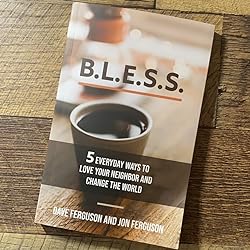
What does evangelism look like? How do we know we are being faithful to the great commission when Jesus called us to go into all the world and make disciples?
I was recently introduced to an excellent book called, “B.L.E.S.S: 5 Everyday Ways to Love Your Neighbor and Change the World.” There are many things I appreciate about it.
First, it’s written in an accessible, simple way. Second, authors Jon and Dave Ferguson, write about themselves in humble and self-deprecating ways. They don’t give the impression that they have mastered evangelism. Instead, they help me as a reader learn and grow from their mistakes. Finally, and most importantly, the book is Biblically thoughtful and introduces the idea that evangelism is not merely confronting someone with a call to faith and repentance. God does call us to this (Rico Tice, in his book Honest Evangelism, calls it “crossing the pain-line”). But the Lord calls us to put the Gospel we share in the context of a relationship. This demonstrates that God desires bless our neighbors through us. In Genesis 12, God told Abraham that he would bless him and his children. Through Abraham’s family all the families on the earth would be blessed.
The Fergusons introduce 5 ways to practice this:
B:EGIN WITH PRAYER: a life of prayer for non-Christian friends and neighbors reminds us that we are not able to transform their hearts. This positions us in the correct posture of spiritual dependence on the Holy Spirit. Do you have 1 or 2 people for whom you are praying God will give the gift of faith and eternal life?
L:ISTEN: Proverbs 18:13 says, “If one gives an answer before he hears, it is his folly and shame.” If you read through the Proverbs, the wise person is slow to speak but listens long.
The authors suggest four tools for listening well:
- History: “Tell me your story.” “Where did you grow up?
- Heart: “What things do you love? What’s your favorite team, restaurant?”
- Habits: “What do you like to do with your free time?
- Hurts: “How are you doing with (name the situation)?”
E:AT: Sam Chan, an instructor at City Bible Forum, recommends that we move through stages of gradually growing relationship: beginning with coffee, then inviting to have lunch together, and finishing by inviting a non-Christian friend over for dinner. Jon and Dave Ferguson agree that food and relationships tend to go together. Food also gives an opportunity to practice the listening practice listed above! Christians are called to practice hospitality with one another (Romans 12:13), and with strangers (Hebrews 13:2). I’ve written more about this in a previous pastor’s post here: https://www.harvestopc.org/from-the-pastors-desks/post/the-three-legged-stool-of-outward-ministry
S:ERVE: to bless your neighbor, Jesus invites you to serve.
R.P.M.S. Tool (this stands for Relational, Physical, Mental and Spiritual questions). The authors encourage us to be interested in the whole person when we are loving our neighbor. Ask questions about how they are doing relationally. How is their home life, marriage, dating, friends, and work relationships going? Physically, are they able to sleep at nights, eat and get some exercise? Mentally, do they face depression, anxiety? What are they learning and how are they encouraged by this? These other categories are all understood through who your neighbor is spiritually. Being interested in them as complete, embodied human beings often opens the door for you to ask, “How can I pray for you?” Do your neighbors have spiritual questions or sense that something is missing in their life?
S:TORY: testify to God’s work in your life. One of the things I love about Harvest is an emphasis on testimonies. It’s mid-October and I’m already looking forward to our Thanksgiving service when we’ll get to hear of the ways God has been working in our lives. We also are intentional about publishing every person’s testimony when they profess their faith. We do this because we believe sharing about God’s redemption in our lives is a powerful way that God continues to work. If you are discouraged and feeling down, sit down with a blank piece of paper and write out 3 times when you were in the darkest valleys, and how God led you faithfully through them. I promise you’ll be encouraged as you think about the story of God’s faithfulness in your life. Sharing these stories with a person you have been working hard to get know is one of the most powerful ways the Spirit can work through us to reach the lost.
I thoroughly enjoyed Jon and Dave Ferguson’s book. The book’s only weakness, that I could find, was their discomfort with thinking of evangelism as confrontation. We live more and more in a culture that values toleration, no judgment, and “acceptance” at all costs. Christians should, as I write above, grow in these 5 B.L.E.S.S. practices. But, if we love our non-Christian friend, we do need to patiently and humbly confront them with an area of their life where God is calling them to repentance.
Write a Comment